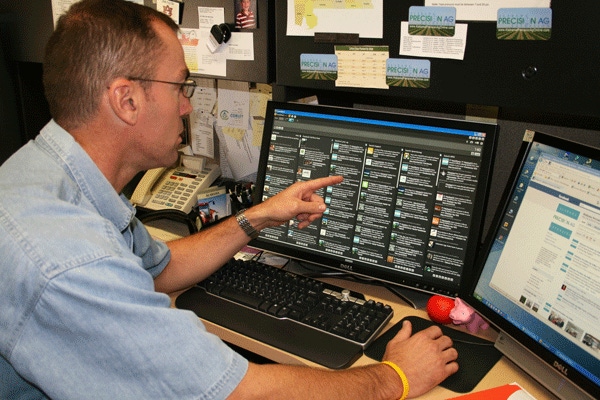
Precision farming information spread through social media
• John Fulton’s professional focus, precision farming, is one of the main ways farmers are using cutting-edge technology to reduce their use of inputs such as water, nutrients and pesticides, not only to save money, but also to reduce farming’s environmental impact.• John Fulton discovered that social networking enabled him to share the real-life concerns gathered from face-to-face encounters with an even wider circle of producers.
October 22, 2010

John Fulton is a bit like the skeptic who has finally seen the light. What he now values — social media — he once regarded with cynicism, if not mild disdain.
But that’s not surprising: Fulton is a Cooperative Extension educator, one among a legion of professionals who have traditionally viewed face-to-face interaction with clients as the essence of their work.
By diluting the sorts of high-touch relationships that have always characterized good Extension work, social media seemed counterintuitive or, at least, not the best Extension approach — or so he initially thought.
But like any good scientist, he checked it out. To gain some perspective, he even began using Facebook, then tweeting and blogging.
These experiences changed his mind. Far from hindering his work with clients, Fulton discovered that social networking actually enriched it.
He also discovered something equally as valuable: Social networking enabled him to share the real-life concerns gathered from face-to-face encounters with an even wider circle of producers.
“If I restrict dialogue only to a one-on-one conversation, then only that person can take advantage of it, but if I can take what I’ve learned and incorporate it into a blog or take pictures and write tags along with them, we can point more people to this information,” says Fulton, an Alabama Extension specialist and Auburn University associate professor of biosystems engineering.
His main professional focus, precision farming, is one of the main ways farmers are using cutting-edge technology to reduce their use of inputs such as water, nutrients and pesticides, not only to save money, but also to reduce farming’s environmental impact.
“Of course, they can choose to use the information or not, but, basically with the flip of a switch, you are making this information available not only to one client but potentially to millions.”
Along the way, he also discovered how traditional face-to-face interactions and social media can work in tandem to enhance the effectiveness of his Extension efforts.
As he describes it, traditional face-to-face encounters provide seeds, which he and other Precision Ag Team members — Amy Winstead, Daniel Mullenix and others — cultivate by sharing with other producers wired into the teams growing social network.
Similar questions
“We always work with the assumption that if these growers are asking these kinds of questions, so are a lot of others out there.”
Fulton says he and other team members have learned how to use social media tools to reframe important messages that often get lost in the hustle and bustle of daily farm life.
“Sometimes when you tweet or post on Facebook it’s kind of like collecting books on your desk — important stuff gets shifted down and forgotten as you stack more and more books,” Fulton says.
“We had to find a way to resurrect some of this information so that it did not get lost and that is where the website has turned out to be valuable means to keep important information at the forefront.”
The multiplier effect is also helping in another important way by helping Fulton and other team members extend their reach to the increasing number of growers throughout the world who want to learn more about the practical benefits of precision farming.
“It opens up a whole new avenue of communications and exposure,” Fulton says, who adds that he got his first inkling of the precision farming team’s social media impact at this year’s International Precision Farming Conference.
Yet, at the heart of this effort lies another motivation: Fulton’s desire to underscore the indispensable role that modern farming methods play in the livelihoods and future of virtually every man, woman and child on this planet.
Fulton, who grew up on an Ohio truck farm, makes no bones about that fact. In social networking parlance he is known as an “agvocate”— a proponent of the role modern farm methods serve in feeding and clothing billions of human beings across the planet.
If, for whatever reason, farming is prevented from continuing its centuries-old trek toward new insights and innovations, its ability to feed a projected 9 billion people by 2030 will be seriously threatened, he says.
“We view promoting agriculture as the number one thing — we are doing good things; we are being efficient; we are helping producers and enabling them to operate their farms in an environmentally sound way,” Fulton says.
Anything he can do to keep farmers abreast of rapidly advancing technology while informing consumers about how these techniques ultimately serve them by reducing food prices and safeguarding the environment is, as far as he’s concerned, all in a day’s work.
You May Also Like



